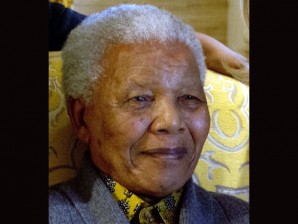Mandela spends second day in hospital
JOHANNESBURG—Nelson Mandela was spending a second day in hospital Friday after responding positively to treatment for a lung infection, the latest health scare for the revered anti-apartheid icon.
South African presidency spokesman Mac Maharaj said there was no update on the condition of the frail 94-year-old, who was admitted to hospital just before midnight on Wednesday.
President Jacob Zuma sought Thursday to reassure South Africans that Mandela was in good hands as his doctors reported some progress in his treatment.
“The country must not panic, Madiba is fine,” Zuma told the BBC, referring to South Africa’s first black president by his clan name.
“The doctors advise that former president Nelson Mandela is responding positively to the treatment he is undergoing for a recurring lung infection,” Zuma’s office said in a short statement Thursday.
The Nobel peace laureate was conscious when he was admitted, Maharaj, who was in prison with Mandela on Robben Island, had told AFP.
It is the second time this month that Mandela has been admitted to hospital, after spending a night for checkups on March 9.
That followed a nearly three-week hospital stay in December, when Mandela was treated for another lung infection and underwent gallstone surgery, after which he was released for home-based care.
The series of hospitalisations has seen an outpouring of prayers, but has also seen South Africans come to terms with the mortality of their national hero.
“In Zulu, when someone passes away who is very old, people say he or she has gone home. I think those are some of the things we should be thinking about,” Zuma said.
Mandela is idolised in his home nation, where he is seen as the architect of the country’s peaceful transition from a white-minority ruled police state to hope-filled democracy.
Nearly 20 years after he came to power in 1994 he remains a unifying symbol in a country still riven by racial tensions and deep inequality.
Labour unrest, high-profile crimes, grinding poverty and corruption scandals have effectively ended the honeymoon enjoyed after Mandela ushered in the “Rainbow Nation”.
“He is the voice that holds the country together,” said Kasturi Pandaram in Durban.
“He’s been a stalwart and I think if anything should happen to him now, with the state the country is in, I think it’s going to fall apart,” she said.
A figure from another era
While Mandela the symbol bestrides South African politics, the man has long since exited the political stage and for the country’s large young population he is a figure from another era.
He has not appeared in public since South Africa’s football World Cup final in 2010, six years after retiring from public life.
Still, his nearly life-long struggle against apartheid resonates.
“We are deeply concerned with Nelson Mandela’s health — he is a hero, I think, to all of us,” US President Barack Obama said.
“When we think of a single individual that embodies the kind of leadership qualities that I think we all aspire to, the person’s name that comes up is Nelson Mandela. So we wish him all the very best,” Obama added.
“He is as strong physically as he has been in character and in leadership over so many decades. Hopefully he will come out of this latest challenge.”
‘Hope he may come back home’
The name and location of the hospital where Mandela is being treated were not disclosed, to allow the medical team to focus on their work and to shield the family from the intense media interest.
“We know they are going through a difficult time and we want to ensure that their privacy is maintained,” said Maharaj.
In the past he has been hospitalised at a clinic in Pretoria.
Away from the public eye Mandela has grown increasingly frail.
His December hospital stay was his longest since he walked free from 27 years of apartheid jail in 1990.
Earlier this month, his friend and renowned human rights lawyer George Bizos, who defended Mandela during his 1960s treason trial, said the ex-president was aware of current political events but was having some memory lapses.
Respiratory infections are often a key cause of death among the elderly, according to pulmonologist Bertrand Dautzenberg.
News of Mandela’s latest ill health was slow to reach Qunu, his rural childhood village in Eastern Cape province where he has a home.
“Most of the people in the village don’t know even that he is in hospital,” Zimsile Gamakulu, a local guide from the Madiba clan, told AFP.
Villagers “wish him a long life”, he said.
“They miss him a lot, especially the older ones,” he added. “They hope that he may come back home.”















